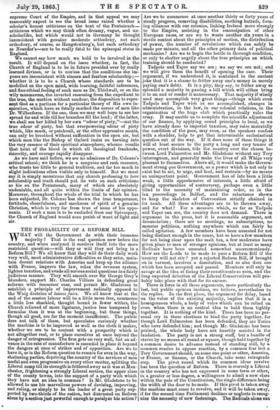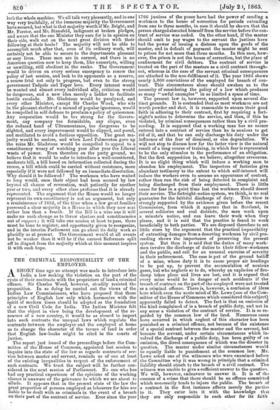THE PROB113ILITY OF A REFORM BILL.
WHAT will the Government do with their immense majority ? That is the real question now before the country, and when analyzed it resolves itself into the more restricted question—will they or will they not bring in a Reform Bill ? We all know that they will do their daily work very well, meet administrative difficulties as they arise, main- tain decent relations with America and keep up the alliance with France, improve the law, relax the revenue system, lighten taxation, and evade all serious social questions in a fairly judicious manner. They will smooth over Sir George Grey's blunders, support Mr. Charles Villiers in defending great reforms with insouciant ease, and permit Mr. Gladstone to establish a principle of improvement radically opposed to the Whig doctrine of laissez fairs. We all know that at the end of the session labour will be a little more free, commerce a little less shackled, thought bound in fewer withes the Church relieved of more ligatures, justice less hampered by formulas than it was at the beginning, but these things, though all good, are for the moment insufficient. The public does not talk a them, but speculates curiously whether the machine is to be improved as well as the cloth it makes, whether we are to be content with a prosperity which is not altogether real, or to place ourselves at once beyond the danger of retrogression. The firm gets on very well, but an ad- vance in the rate of manufacture is essential to place it beyond the dangers at once of strikes and of opposition. Are we to have it, or is the Reform question to remain for even in the way, shattering parties, depriving the country of the services of men useful and even progressive on every other matter, splitting the Liberal camp till its strength is frittered away as it was at Man- chester, frightening a strongly Liberal section, the upper class of the county towns, into the support of a party with which they have not an idea in common ? Is Mr. Gladstone to be allowed to use his marvellous powers of devising, improving, and ruling, or simply to be the leader of a great party sup- ported by two-thirds of the nation, but distrusted on Reform alone by a Beetioa jaat powerful enough to paralyze his action? Are we to commence at once another thirty or forty years of steady progress, removing disabilities, soothing hatreds, form- ing alliances with our colonies, linking Ireland more strongly to the Empire, assisting in the emancipation of other European races, or are we to waste another six years in a sterile contest about the principles of motion, the distribution of power, the number of revolutions which can safely be made per minute, and all the other primary data of political mechanics ? Are we to begin the battle in thorough condition. or only to chatter angrily about the true principles on which training should be conducted ?
Tadpole and Taper say we are we say we are not; and we will give them the benefit of opening the case. Their argument, if we understand it, is contained in the ancient joke that it is a shame to fritter away one's money in merely paying one's debts. It is a pity, they say, to fritter away so splendid a majority in passing a bill which will either bring it to an end or render it unnecessary. That majority if wisely used may accomplish very great things—things which even Tadpole and Taper wish to see accomplished, changes in administration in the law, in our colonial relations, in the organization Of the huge club which practically rules the army. It may enable us to complete the scientific adjustnient of our finance, by applying sound principles to local, as we have already done to imperial taxation, may raise materially the condition of the poor, may even, as the speakers confess with a shudder, help to get that interminable ecclesiastical question out of the way. If it does none of these things it will at least secure to the party a long and easy tenure of power, avert divisions, tide the country over the chasm be- tween Lord Palmerston and Mr. Gladstone without any Tory interregnum, and generally make the lives of all Whigs very pleasant to themselves. Above all, it would make the Govern- ment strong qua Government, as a power which is not only to exist but to act, to urge, and lead, and restrain—by no means an unimportant point. Government has of late been a little weak, a little apprehensive of interests, a little afraid of giving opportunities of controversy, perhaps even a little blind to the necessity of maintaining order, as in the lax proceedings in Belfast, and the reluctance shown to keep the skeleton of Convocation strictly chained in its tomb. All these advantages are to be thrown away, and for what? For a measure which, so far as Tadpole and Taper can see, the country does not demand. There ie argument in the press, but it is reasonable argument, not denunciation ; there are no meetings, no subscriptions, no monster petitions, nothing anywhere which can fairly be called agitation. A few members have been unseated for not being distinct enough in the cause, but so have a few members for not being clear upon the malt tax, a few moderates have given place to men of stronger opinions, but at least as many Radicals have been unseated somewhat unceremoniously. How are the Lords to be made to pass a Reform Bill if the 'country will not stir ? yet a rejected Reform Bill, if brought on in earnest, involves a dissolution, and so also does one which has been accepted and passed. Members will only be savage at the idea of facing their constituents so soon, and the long- expected defection of the Liberal Conservatives will pro- bably take place with that for its excuse. • There is force in all these arguments, more particularly the last, but public opinion inclines, we believe' nevertheless to the replies. In the first place, the argument for delay, based on the value of the existing majority, implies that it is a homogeneous whole, a body of votes which can be relied on even when there is no central idea to hold them tightly together. It is nothing of the kind. There has been no per- sonal cry in these elections to bind the party together, for though Lord Palmerston has been defended, they are Tories who have defended him; and though Mr. Gladstone has been praised, the whole body have not heartily assisted in the laudation. The party is not a strong staff, but a bundle of staves by no means all round or square, though held together by a common desire to advance instead of standing still, by a common resolve to oppose reaction, by a common fear lest a Tory Government should, on some one point or other, America, or France, or finance, or the Church, take some retrograde step. The pivot round which its common ideas revolve has been the question of Reform. There is scarcely a Liberal in the country who has not expressed in some form or other, in a greater or less degree, a willingness to admit a new class within the pale of the Constitution, the single difference being the width of the door to be made. If this pivot is taken away the machine mast cease to revolve, and it will be taken away, if for the second time Parliament declines or neglects to recog- nize the necessity of new fastenings. The Radicals alone can lock the whole machine. We all talk very pleasantly, and in one way very truthfully, of the immense majority the Government have secured, but what is that majority worth if Mr. Bright, and Mr. Forster, and Mr. Stansfeld, indignant at broken pledges, and aware that the one Minister they care for is in opinion on their side, walk out on the next great division with their following at their heels ? The majority will not be able to accomplish much after that, even of its ordinary work, will certainly not be able to secure to the departments pleasant or easy lives. These men are in earnest, and there is no American question now to keep them, like conscripts, willing or unwilling, still obedient in the ranks. The Government would be driven on every serious emergency to renew the policy of last session, and look to its opponents as a reserve, a course fatal not only to progress, but even to the strong government Tadpole and Taper love. Every interest would be wanted and almost every individual ally, criticism would be dangerous, and a new idea merely a ladder to facilitate hostile escalade. Mr. Gladstone would be paralyzed, and every other Minister, except Sir Charles Wood, who sits in the pleasant shelter of a mound of popular ignorance, would be compelled in self-defence to proclaim a policy of quiescence. Any corporation would be too strong for the Govern- ment, any company too formidable, any clique, even the reduced band of Ultramontanes, too dangerous to be slighted, and every improvement would be clipped, and pared, and mutilated to avoid a factious opposition. The great ma- jority would be useless, and when Lord Palmerston gave up the reins Mr. Gladstone would be compelled to appeal to a constituency weary of watching year after year the Liberal waste of power. Even therefore on the party ground, we believe that it would be safer to introduce a well-considered, moderate bill, a bill based on information collected during the recess, a bill which could be carried without resistance, more especially if it were not followed by an immediate dissolution. Why should it be followed ? The workmen who have waited so long would, once, their object had been secured by law beyond all chance of revocation, wait patiently for another year or two, and every other class professes that it is already represented. The argument that the House would no longer represent its own constituency is not an argument, but only a reminiscence of 1832, of the time when a few great families possessed a clear majority in a House in which they now seat rather less than a fourth. If the Bill is a wise one it will make no such change as to throw electors and constituencies out of rapport ; it will take one session at least to pass, there must be time to register, and opportunity given to reorganize, and in the interim Parliament can go about its daily work as placidly as at present. The Government would at all events not be weaker than it will be if the earnest Reformers split off in disgust from the majority which at this moment inspires it with such hope.































 Previous page
Previous page